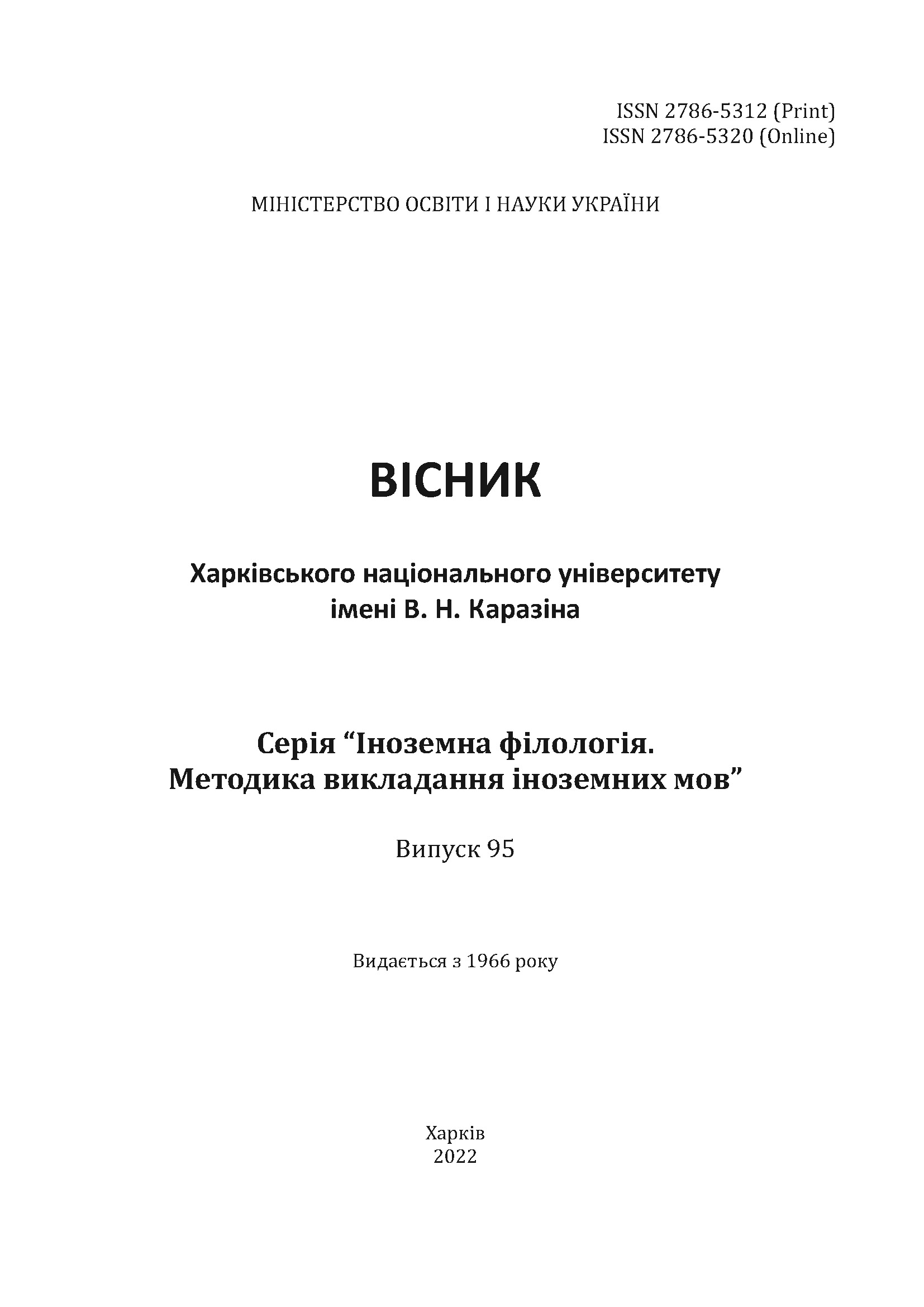Основні види самостійної роботи студентів немовних спеціальностей
Анотація
Самостійна робота студентів є необхідним компонентам освітнього процесу та дозволяє сформувати спеціалістів, які здатні творчо мислити, швидко приймати рішення під час вирішення нестандартних ситуацій, самостійно планувати та аналізувати власні дії. Разом із тим, для ефективної організації самостійної роботи необхідно правильно добирати види самостійної роботи, які відповідають освітнім цілям та рівню знань студентів. Отже, статтю присвячено узагальненню видів самостійної роботи студентів немовних факультетів під час вивчення англійської мови. Узагальнено підходи науковців до визначення сутності самостійної роботи (складник процесу навчання та зазначає, що це така робота, яка виконується у спеціально відведений для цього час без безпосередньої допомоги педагога, але за його завданням та під його контролем; вид індивідуальної навчальної діяльності студентів, що передбачає керування їхньою пізнавальною діяльністю з боку викладача за допомогою методичних вказівок, бесід, колоквіумів, консультацій протягом навчальних занять). Визначено основні цілі самостійної роботи студентів (формування уміння використовувати спеціальну документацію та літературу, розвиток пізнавальних здібностей та активності студентів, набуття навичок вирішення практичних проблем під час здійснення педагогічної діяльності, формування самостійності мислення, саморозвиток, самовдосконалення та самореалізація). Узагальнено основні види самостійної роботи студентів немовних факультетів (самостійна робота за зразком; конструктивно-варіативна самостійна робота; евристична самостійна робота; дослідницька самостійна робота) та проілюстровано завдання для студентів немовних спеціальностей. Установлено, що самостійну роботу за зразком доцільно пропонувати студентам одразу після вивчення нового матеріалу, до самостійної роботи конструктивно-варіативного типу відносять підготовку доповідей на певну тематику за схемою, що була запропонована викладачем; підготовку рефератів англійською мовою; використання нового лексичного або граматичного матеріалу в усному мовленні після його опрацювання з викладачем тощо. Евристичні роботи вчать самостійно формулювати навчальне завдання та розробляти план його рішення. На цьому рівні здійснюється більш глибоке розуміння явищ, процесів і починається творча діяльність. Продовженням евристичних самостійних робіт є дослідницькі роботи студентів, під час виконання яких студенти відходять від зразка, їх діяльність набуває пошукового характеру. Цей вид самосійної роботи використовується під час підготовки студентів до виступів на конференціях або написання наукових статей.
Завантаження
Посилання
Belyaev, Yu. I., & Stetsenko, N. M. (2010). Naukovo-doslidna diialnist studentiv u strukturi roboty universytetu [Research activity of students in the structure of the university]. Pedahohichnyi almanakh [Pedagogical Almanac], 6, 188–191. (in Ukrainian)
Broda, M. V. (2013). Tendentsii orhanizatsii samostiinoi roboty studentiv z anhliiskoi movy [Trends in the organization of individual work of students in the English language]. Naukovyi visnyk Donbasu [Scientific Bulletin of Donbass], 4. Retrieved from http://nbuv.gov.ua/j-pdf/nvd_2013_4_38.pdf. (in Ukrainian)
Esipov, B. P. (1961). Samostoiatelnaia rabota uchashchykhsia na urokakh [Individual work of students in class]. Moskva: Hosudarstvennoe uchebno-pedahohycheskoe yzdatelstvo mynysterstva prosveshchenyia RSFSR Publ. (in Russian)
Korol, V. M., & Savchenko, O. P. (2003). Samostiina robota studentiv universytetu yak skladova pidhotovky maibutnoho fakhivtsia [Individual work of university students as a component of the training of the future specialist]. Orhanizatsiia samostiinoi roboty studentiv [Organization of independent work of students], 9–13. (in Ukrainian)
Kostenko, O. V. (2014). Samostiina robota studentiv v umovakh osobystisno-oriientovanoho navchannia ta yii informatsiino-metodychne zabezpechennia pry vyvchenni inozemnoi movy [Individual work of students in personality-oriented learning and its information and methodological support in the study of a foreign language]. Visnyk Zaporizkoho natsionalnoho universytetu. Ser. Pedahohichni nauky [Bulletin of Zaporizhia National University. Series “Pedagogical Sciences”], 2(23), 52–61. (in Ukrainian)
Lavrysh, Yu. E. (2013). Osoblyvosti orhanizatsii naukovo-doslidnytskoi diialnosti studentiv vyshchykh navchalnykh zakladiv [Features of organizing research activities of higher educational institutions students]. Visnyk Natsionalnoho tekhnichnoho universytetu «Kyivskyi politekhnichnyi instytut». Ser. : Filolohiia, Pedahohika [Bulletin of National Technical University “Kyiv Polytechnic Institute”. Series “Philology, Pedagogy”], 2, 72−76. (in Ukrainian)
Mochalova, N. S. (2010). Zavdannia dlia samostiinoi roboty studentiv iz rozvytku navychok usnoho movlennia [Tasks for independent work of students on the development of oral speech skills]. Humanit. visn. NUK. [Humanity Bulletin of NUK], 3, 64–66. (in Ukrainian)
Skatkyn, M. N. (1971). Sovershenstvovanye protsessa obuchenyia [Improvement of the learning process]. Moskva: Pedahohyka Publ. (in Russian)
Frolova, I. V. (2012). Naukovo-doslidnytska diialnist studentiv – peredumova vyperedzhuvalnoho rozvytku fakhivtsia [The research activity of students as a prerequisite for the advanced development of a specialist]. Naukovi zapysky [Nizhynskoho derzhavnoho universytetu im. Mykoly Hoholia]. Seriia «Psykholoho-pedahohichni nauky» [Scientific notes [Nikolai Gogol Nizhyn State University]. Series “Psychological and pedagogical sciences”], 7. Retrieved from http://nbuv.gov.ua/UJRN/Nzspp_2012_7_46. (in Ukrainian)
Chernovol-Tkachenko, O. O. (2009). Naukovo-doslidnytska diialnist studentiv u VNZ Ukrainy: zmist i zavdannia [Scientific and research activities of students in universities of Ukraine: content and tasks]. Visnyk Kharkivskoho natsionalnoho universytetu imeni V. N. Karazina. Seriia «Romano-hermanska filolohiia. Metodyka vykladannia inozemnykh mov» [Bulletin of V. N Karazin Kharkiv National University. Series “Roman and German philology. Methods of teaching foreign languages”], 866, 194–201. Retrieved from http://foreign-languages.karazin.ua/resources/b59a9fdaa216a4a28f81d900cc46079e.pdf. (in Ukrainian)




